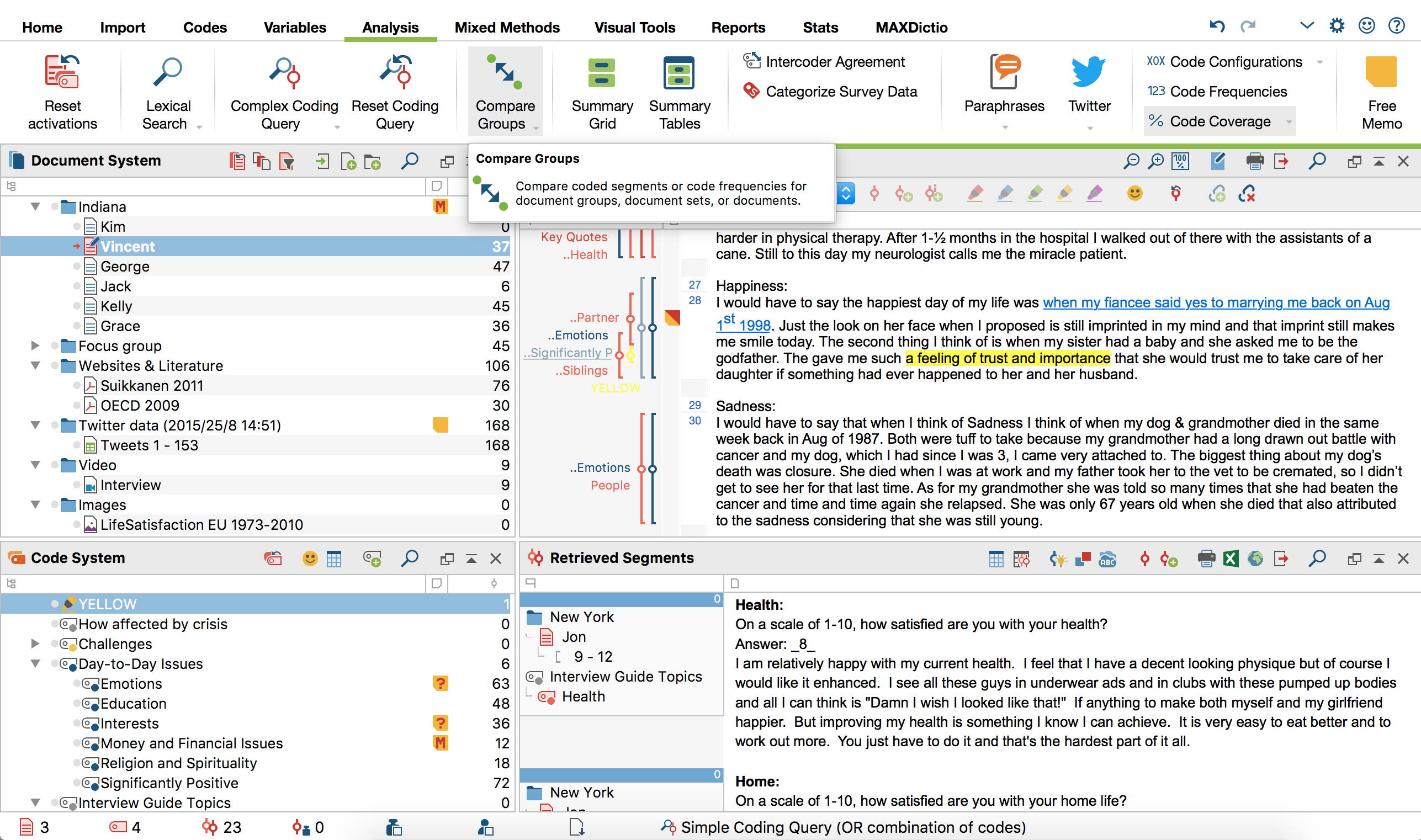

Leventhal’s CSM framework is commonly used to understand and describe the processes involved in initiating and maintaining behaviors to manage illness threats.

This also includes exploring the patients’ wording in regard to their illness perceptions. Furthermore, the qualitative approach of this paper allows to understand and get a thorough insight into the patients’ perspectives.
.jpg)
Our paper uses the widely used common sense model as theoretical framework (see below) to investigate illness perceptions. None of these studies utilized a specific theoretical framework to investigate illness perceptions. Only two studies specifically focused on OSDs and four have used a qualitative approach.
#MAXQDA QUALITATIVE ANALYSIS SKIN#
Until now, only few quantitative or qualitative studies have investigated perceptions of patients with eczematous skin diseases. However, these illness perceptions need to be identified and understood in depth, considering all relevant facets. To provide tailored patient education and counseling interventions, addressing illness perceptions in training and counseling is important. Training and counseling these patients is vital to initiate and support behavior change processes. g., use of skin protection products) of patients with occupational HE influences the course of the disease and the ability to work. Besides its socio-economic impacts, both on a patient’s life and society, occupational HE are associated with a high burden of disease and a reduced quality of life. In regard to treating ICD or ACD, it is important to eliminate irritants and/or allergens causing the condition to prevent the disease from becoming chronic. The symptoms of ICD, ACD and AD are similar (e. Thus, diagnoses are frequently combined in a single patient (e. Depending on one’s genetic disposition, atopic dermatitis (AD) and psoriasis are further risk factors for developing occupational dermatoses and, in case of AD, often occur in combination with ICD. g., hair dyes, fragrances, rubber accelerators). g., cleaning agents, detergents), and/or allergic contact dermatitis (ACD), resulting from skin contact to an allergen the individual patient is sensitized to (e. Most occupational HE occur as contact dermatitis (CD), predominantly as irritant contact dermatitis (ICD), caused by skin exposure to irritants (e. For instance, hairdressers, healthcare workers and metal workers are at particularly high risk of developing occupational HE due to skin exposure to irritants and allergens. Occupational skin diseases (OSD), especially hand eczema (HE), are one of the most common work-related diseases in Europe and play an important role worldwide, especially in industrialized countries. The funders had no role in study design, data collection and analysis, decision to publish, or preparation of the manuscript.Ĭompeting interests: The authors have declared that no competing interests exist. Furthermore, the publication of this study was supported by Deutsche Forschungsgemeinschaft (DFG) and Open Access Publishing Fund of Osnabrück University. ext FF_1436, was funded by the Institution for Statutory Accident Insurance and Prevention in the Health and Welfare Services. Details on data are available upon request from the corresponding author or by the Institute for Health Research and Education, Department of Dermatology, Environmental Medicine and Health Theory, University of Osnabrück, Am Finkenhügel 7a, 49076 Osnabrück, Germany (email: The project ‘Mixed-methods study to assess illness perceptions of patients with occupational contact dermatitis of the hands for enhancing patient education and counseling’, project no. This decision was made in accordance with the ethics committee of the University of Osnabrück. The interviews contain sensitive patient data.
#MAXQDA QUALITATIVE ANALYSIS FULL#
This is an open access article distributed under the terms of the Creative Commons Attribution License, which permits unrestricted use, distribution, and reproduction in any medium, provided the original author and source are credited.ĭata Availability: Data cannot be shared beyond individual quotations in the manuscript because participants did not give consent in terms of publication of their full transcript. Received: DecemAccepted: ApPublished: May 12, 2023Ĭopyright: © 2023 Buse et al.

PLoS ONE 18(5):Įditor: Aiggan Tamene, Wachemo University, ETHIOPIA Citation: Buse A-S, Wilke A, John SM, Hansen A (2023) Illness perceptions of occupational hand eczema in German patients based on the common-sense model of self-regulation: A qualitative study.


 0 kommentar(er)
0 kommentar(er)
